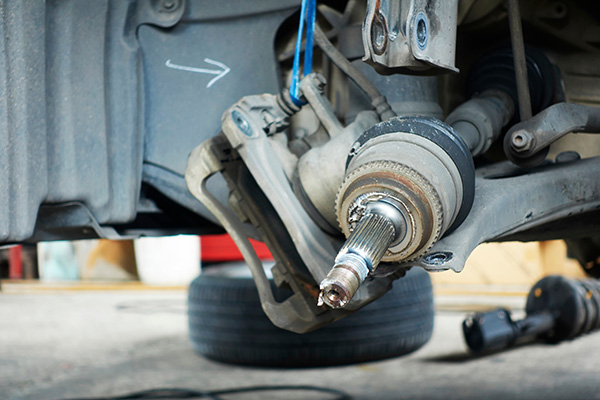Posted on 5/28/2024

Do you notice a strange vibration or clicking noise beneath your car while turning? What could it be? One common reason is a worn CV axle, a critical component of your vehicle's drivetrain. We'll explore how CV axle wear and tear can significantly affect your vehicle's performance and safety. What Is the CV Axle Your vehicle's constant velocity (CV) axle is crucial in transferring power from the engine to the wheels, allowing for smooth and consistent motion. It serves as the bridge between the transmission and the wheels, transmitting torque while accommodating the up-and-down motion of the suspension system. Without a functioning CV axle, your vehicle's drivetrain would be rendered ineffective, resulting in loss of power and compromised handling. Signs of a Worn CV AxleClicking or Clunking Noises: One of the most common indicators of a worn CV axle is a clicking or clunking noise, particularly noticeable duri ... read more
Posted on 4/27/2024

In today's world, where fuel prices rise more often than ever, maximizing fuel efficiency has become a top priority for many drivers. Whether you're a daily commuter or embarking on a road trip, implementing strategies to make the most out of every drop of fuel can help you save money and reduce your environmental footprint. 1. Maintain Your Vehicle Regularly Regular maintenance is crucial for optimal fuel efficiency. Ensure that your vehicle's engine is tuned up and all systems are in good working condition. This includes regular oil changes, air filter replacements, and tire rotations. A well-maintained vehicle operates more efficiently, consuming less fuel and emitting fewer pollutants into the atmosphere. 2. Drive Smoothly and Efficiently Aggressive ... read more
Posted on 3/29/2024

Ever wondered what makes steering your car feel as effortless as a gentle breeze? The power steering system, a marvel of automotive engineering designed to make maneuvering your vehicle a breeze. The Power Steering System Have you ever wondered how effortlessly you can turn the steering wheel, even when your car is stationary? The power steering system, a hydraulic or electrically assisted mechanism that reduces the amount of effort required to steer your vehicle, makes this wizardry possible. Whether you're navigating tight city streets or cruising down the highway, the power steering system enhances maneuverability and driver comfort. Hydraulic vs. Electric Power Steering Are you curious about the different types of ... read more
Posted on 2/29/2024
.jpeg)
Have you ever wondered whether it's necessary to start your car before hitting the road, especially on those rushed mornings? Many of us have heard conflicting advice on this matter, but what's the truth behind it? The Myth of Warming Up Your Car For decades, it has been ingrained in our automotive culture that allowing your car to idle for a few minutes before hitting the road is essential to warm up the engine and ensure optimal performance. However, this belief is rooted in outdated practices and misconceptions about how modern vehicles operate. In the past, carbureted engines relied on a manual choke to regulate airflow and fuel mixture during cold starts. These engines required a significant warm-up period to achieve proper fuel vaporization and combustion, especially in colder climates. As a result, drivers would often let their cars idle for s ... read more
Posted on 1/30/2024
.jpeg)
Have you ever wondered about the life story of a car? Just like a biography that tells you all about a person's past, CARFAX offers a comprehensive history of vehicles. In a world where the past of a used car can be as mysterious as a novel, CARFAX comes in as the ultimate detective. What Is CARFAX? CARFAX is a beacon in the foggy journey of purchasing a used vehicle. Established to bring transparency into the used car market, it provides detailed history reports of vehicles based on their Vehicle Identification Number (VIN). These reports include crucial information such as past ownership, accident history, service records, and more. It's akin to having a time machine, giving you a glimpse into every chapter of a car's life. Why Is CARFAX Useful? The utility of CARFAX can't be overstated. It's like having a crystal ball that reveals ... read more